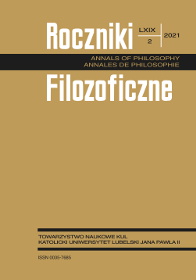Strukturalność a dedukcyjność matematyki: współczesny strukturalizm w filozofii matematyki
Współczesny strukturalizm w filozofii matematyki
Abstrakt
Wspólne dla różnego typu strukturalizmów matematycznych jest stwierdzenie, że dla matematyki jako nauki prawdziwa jest koniunkcja: a) matematyka jest nauką o strukturach oraz b) matematyka jest nauką dedukcyjną.
Przedstawiane są odmienne argumenty na rzecz tych dwóch własności matematyki i różnie rozumiane są pojęcia strukturalności i dedukcyjności, co skutkuje powstawaniem różnego rodzaju strukturalizmów. Twierdzimy, że przy pewnym ustalonym sposobie rozumienia tych pojęć możliwa jest ich równoważność. Argumentujemy na rzecz takiego rozumienia strukturalizmu, które streszcza się w stwierdzeniu: a) matematyka jest nauką o strukturach wtedy i tylko wtedy, gdy b) matematyka jest nauką dedukcyjną.
Bibliografia
Ajdukiewicz, Kazimierz. 1921. „Pojęcie dowodu w znaczeniu logicznym”. W: Język i poznanie. T. 1. Warszawa: Państwowe Wydawnictwo Naukowe [PWN] (= Ajdukiewicz 1960).
Ajdukiewicz, Kazimierz. 1960. Język i poznanie. T, 1. Warszawa: Państwowe Wydawnictwo Naukowe [PWN].
Ajdukiewicz, Kazimierz. 1965. Logika pragmatyczna. Warszawa: Państwowe Wydawnictwo Naukowe [PWN].
Benacerraf, Paul. 1965. „What Numbers Could Not Be”. Philosophical Review 74: 47–73. Przedruk w: Benacerraf i Putnam 1983, 271-294.
Benacerraf, Paul, i Hilary Putnam H. 1983. Philosophy of mathematics. selected readings, Cambridge: Cambridge Universitv Press.
Cantor, Georg (1883), Grundlagen einer allgemeinen Mannigfaltigkeitslehre. Leipzig: Teubner. Przedruk w: Zermelo 1932.
Dadaczyński, Jerzy. 2002a. „Antynomie teoriomnogościowe a powstanie klasycznych kierunków badania podstaw matematyki”. W: Matematyka w oczach filozofa, 224–243. Kraków: OBI, Tarnów: Biblos (= Dadaczyński 2002b).
Dadaczyński, Jerzy. 2002b. Matematyka w oczach filozofa. Kraków: OBI, Tarnów: Biblos,
Dedekind, Richard. 1888. Was sind und was sollen die Zahlen?. Brunsehweig: Fredrieh Yieweg und Solin. Ang.: The nature and meaning of numbers. Tłum. Wooster Woodruff Beman. W: Dedekind 1963, 1-58.
Dedekind, Richard. 1963. Essays on the Theory of Numbers. Tłum. Wooster Woodruff Beman. New York: Dover Publications,
Heiberg, J.L., i Richard Fitzpatrick. 2008. Euclid’s Elements of geometry: the Greek text of J.L. Heiberg (1883-1885): from Euclidis Elementa edidit et Latine interpretatus est I.L. Heiberg, in aedibus B.G. Teubneri, 1883–1885. Edited, and provided with a modern English translation, by Richard Fitzpatrick. First edition – 2007. Revised and corrected – 2008. B.m.w.: b.w.
Hellman, Geoffrey. 1989. Mathematics without Numbers: Towards a Modal-Structural Interpretation. Oxford: Clarendon Press.
Hellman, Geoffrey. 2001. „Three Varieties of Mathematical Structuralism”. Philosophia Mathematica 9, issue 2: 184-211. DOI: 10.1093/philmat/9.2.184.
Hellman, Geoffrey. 2005. „Structuralism”. W: The Oxford Handbook of philosophy of mathematics and logic, red. Stewart Shapiro, 536–562. Oxford: Oxford University Press (= Shapiro 2005),
Horsten, Leon. 2007, Philosophy of Mathematics. W: The Stanford Encyklopedia of Philosophy (Spring 2019 Edition), red. Edward N. Zalta. Dostęp 2.01.2019. https://plato.stanford.edu/entries/philosophy-mathematics.
Murawski, Roman. 1994. Filozofia Matematyki. Antologia tekstów klasycznych, Poznań: Wydawnictwo Naukowe UAM.
Mostowski, Andrzej. 1967. „O niektórych nowych wynikach meta-matematycznych dotyczących teorii mnogości”. Studia Logica 20: 99–116.
Parsons, Charles 1990. „The Structuralist View of Mathematical Object”. Synthese 84, no, 3: The Philosophy of Mathematics, Part II (Sep. 1990): 303–346.
Reck, Erich H. 2003. „Dedekind’s Structuralism: An Interpretation and Partial Defense”. Synthese 137, no. 3: 369–419.
Resnik, Michael D. 1981. „Mathematics as a Science of Patterns: Ontology and Reference”. Nous 15, no, 4: Special Issue on Philosophy of Mathematics (Nov., 1981): 529–550.
Resnik, Michael D. 1996. „Structural Relativity”. Philosophia Mathematica 4, issue 2: 83–99.
Resnik, Michael D. 1997. Mathematics as a Science of Patterns. Oxford: Clarendon Press.
Russell, Bertrand. 1920. Introduction to Mathematical Philosophy. London: George Allen and Unwin, LTD. Tłum, pol. Wstęp do filozofii matematyki. Tłum, Czesław Znamierowski, Warszawa: Fundacja Aletheia, 2003.
Shapiro, Stewart (ed.). 2005. The Oxford Handbook of philosophy of mathematics and logic, Oxford: Oxford University Press,
Shapiro, Stewart. 1997. Philosophy of Mathematics: Structure and Ontology. Oxford: Oxford University Press.
Tarski, Alfred. 1969. „Truth and Proof”. Scientific America 220, no. 6: 63-77. Pol.: „Prawda i dowód”. Tłum. Jerzy Krzywicki, w: Tarski 1995, 292-332.
Tarski, Alfred. 1995. Pisma logiczno-filozoficzne. T. 1: Prawda, red. Jan Zygmunt, Warszawa: Wydawnictwo Naukowe PWN.
Tarski, Alfred. 2012. Wprowadzenie do logiki i metodologii nauk dedukcyjnych, Warszawa: Fundacja na rzecz informatyki, logiki i matematyki.
Tkaczyk, Marcin. 2016. „Kazimierz Ajdukiewicz’s Philosophy of Mathematics, Studies in East European Thought 68: 21–38. DOI: https://doi.org/10.1007/s11212-016-9245-x.
Torretti, Ricardo. 1999. The Philosophy of physics. Cambridge: Cambridge University Press,
Van Heijenoort, Jean. 1967. From Frege to Gödel. A Source Book in Mathematical Logic, 1879-1931. Harvard: Harvard University Press,
Von Neumann, Johann. 1923. „Zur Einfuhrung der transfiniten Zahlen”. Acta litteraria Academiae Scientiarum Szegedensis. Acta Scientiarum Mathematicarum 1: 199–208.
Zermelo, Ernst. 1908, „Untersuchungen über die Grundlagen der Mengenlehre. I”. Mathematische Annalen 65, Nr 2: 261–281. DOI: https://doi.org/10.1007/BF01449999. Ang.: „Investigation in the Foundations of Set Theory. I”. w: van Heijenoort, 1967.
Zermelo, Ernst (red.). 1932. Georg Cantor, Gesammelte Abhandlungen mathematischen und philosophischen Inhalts. Berlin: Verlag von Julius Springer.
Copyright (c) 2021 Roczniki Filozoficzne

Utwór dostępny jest na licencji Creative Commons Uznanie autorstwa – Użycie niekomercyjne – Bez utworów zależnych 4.0 Międzynarodowe.





